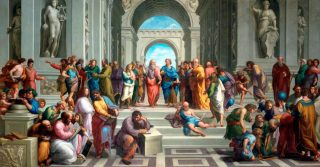
Welcome to the web page of the course Introduction to Philosophy! This humble web page is an on-going project I am undertaking as part of my dedicated initiative to transcend the borders of our classroom. Please ignore the advertisements embedded because I am subscribed to a free web hosting service. Nevertheless, I enjoin you to join me as we embark on this journey and together. Let us explore the intricacies of philosophy as we try to ask the fundamental questions that answer the meaning of our existence.
“Science gives us knowledge, but only philosophy can give us wisdom.” ~ Will Durant
Introduction to Philosophy Edmodo Online Class
To augment our limited class contact hours, we will likewise utilize the functionalities of the website edmodo.com to the fullest. This site will host our online quizzes, online assignments, etc.
To complete your Introduction to Philosophy learning experience, enroll in our edmodo.com online class platform. Here’s how:
- Use this group code to enroll: u2j6id
- For students with existing Edmodo accounts, no need to create one, just use the group code to register in our class.
- For students who are new to Edmodo, follow the steps below:
- Go to www.edmodo.com
- Click the button “I’m a Student” and click “Create New Account.”
- Fill in the needed information such as: First Name, Last Name, the group code, Email address, a Username and a Password (you need to write your Username and Password in your notebook so as not to forget them), then click the button “Submit”
- You are now enrolled! You need to customize your profile by adding information about you, upload a profile image, and other details.
- Your interface is set like a social media feed where you can post status updates, message your friends and classmates including your teacher, friend/unfriend someone and follow someone or some posts.
- We will use Edmodo to host lectures, course contents, online assignments, online quizzes, online submissions, among others. Click here to view a detailed instruction on how to perform basic tasks in Edmodo.
- If you have concerns and queries, please contact me by clicking here.
- Enjoy learning online!
Course description
The course introduction to philosophy focuses on developing philosophical thinking through reflection and analysis on the nature and problems of human person and society. The students are expected to demonstrate philosophical thinking and keep an open mind to recognize and critically assess the important assumptions of different philosophers.
Course objective
The course aims to equip the students with knowledge of basic philosophy from Ancient Greek to Post-modernism philosophies.
Course intended learning outcome (CILOs)
At the completion of this course, the students should be able to:
- Discuss the cosmological concepts of the Pre-Socratic philosophers.
- Classify the political theories from ancient to contemporary philosophers.
- Distinguish the epistemological theories from classical to post-modern philosophers.
- Apply the ethical principles in real life situation.
- Evaluate the application of the philosophical theories in the present society.
- Construct an essay detailing your own philosophy in life.
Student outcomes addressed by the course
The student should be able to:
- Apply principles of ethics and commit to professional ethics and responsibilities.
- Recognize the need for, and prepare to engage in lifelong learning.
Introduction to Philosophy Course topics
Prelim Period (Weeks 1–6)
Orientation: TIP Vision, Mission, Values, School policies, classroom policies. Presentation of OBTL, Syllabus and requirements. Introduction to Philosophy. The Pre-Socratics: The Milesians; Pythagoras; Heraclitus and Parmenides; Empedocles and Anaxagoras; Atomists, and Sophists. Socrates: Socratic Method and The concept of the Good. Plato and Aristotle: Theory of Forms, Allegory of the Cave, Concept of Happiness, Virtue and Golden Mean. The Hellenistic Philosophy: Epicureanism, Skepticism, Cynicism, Stoicism.
Midterm Period (Weeks 7-12)
Medieval Philosophy: St. Augustine and St. Thomas Aquinas, Concept of God, Problem of Evil. The Rise of Modern Metaphysics and Epistemology. Rationalism: Descartes and Dualism, Hobbes and Materialism, Spinoza and Leibniz. Empiricism: Empiricism of Locke / Berkeley and Idealism, David Hume and Skepticism. Critical Philosophy of Immanuel Kant: Copernican Revolution, Structure of the Mind, Categorical Imperative, Phenomenology: Edmund Husserl, Martin Heidegger.
Final Period (Weeks 13-18)
Absolute Idealism of Georg Hegel. Existentialism: Soren Keirkegaard, Albert Camus, Jean Paul Sartre. Marxism: Karl Marx: Dialectical Materialism, Alienation of Labor. Pragmatism: Charles Sanders Pierce, William James, and John Dewey. Feminism: The History of Feminism, The Three Waves of Feminism. Postmodernism: Jean-François Lyotard, Michel Foucault, Jean Baudrillard.
Course references
The course references listed herein are available in the library of TIP Quezon City. I am not requiring you to purchase them. Maximize the use of library as you have paid it already in our miscellaneous fees. However, you may utilize any available and useful resource you deem helpful in your quest to become a true lover of philosophy.
- Dorling Kindersley. (2011). The Philosophy Book. New York: DK Publishing.
- Stumpf, Samuel Enoch. (2008). From Socrates to Sartre and Beyond. New York: McGraw Hill Publishing.
- Palmer, Donald.(2006). Looking at philosophy:The unbearable heaviness of philosophy made lighter 4th Edition. New York: McGraw Hill Companies.
- Gaarder, Jostein. (2004). Sophie’s World. Great Britain: Phoenix House.
- Stanford Encyclopedia of Philosophy. Accessed at https://plato.stanford.edu/entries/
- Internet Encyclopedia of Philosophy. Accessed at http://www.iep.utm.edu/
- The Basics of Philosophy. Accessed at www.philosophybasics.com